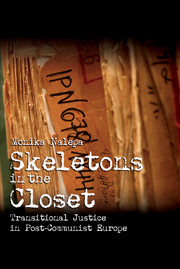Book contents
- Frontmatter
- Contents
- List of Figures
- List of Tables
- Acknowledgments
- List of East Central European Political Organizations
- 1 INTRODUCTION
- Part I Skeletons in the Closet
- Part II Out of the Closet
- 9 EPILOGUE: BETWEEN AGENTS AND HEROES
- Appendix A Mathematical Proofs to Chapter 3
- Appendix B Answers of MPs and Their Constituents to “More Should Be Done to Punish People Who Were Responsible for the Injustices of the Communist Regime”
- Appendix C Sampling Technique and Transitional Justice Survey Questionnaire
- Appendix D Birth and Death of Parliamentary Parties by Their Position Regarding Lustration
- Appendix E Mathematical Proofs to Chapter 7
- Appendix F Lustration Laws by Target, Targeted Activity, and Sanction Type in Poland, Hungary, and the Czech Republic
- Bibliography
- Index
- Titles in the series
9 - EPILOGUE: BETWEEN AGENTS AND HEROES
Published online by Cambridge University Press: 05 June 2012
- Frontmatter
- Contents
- List of Figures
- List of Tables
- Acknowledgments
- List of East Central European Political Organizations
- 1 INTRODUCTION
- Part I Skeletons in the Closet
- Part II Out of the Closet
- 9 EPILOGUE: BETWEEN AGENTS AND HEROES
- Appendix A Mathematical Proofs to Chapter 3
- Appendix B Answers of MPs and Their Constituents to “More Should Be Done to Punish People Who Were Responsible for the Injustices of the Communist Regime”
- Appendix C Sampling Technique and Transitional Justice Survey Questionnaire
- Appendix D Birth and Death of Parliamentary Parties by Their Position Regarding Lustration
- Appendix E Mathematical Proofs to Chapter 7
- Appendix F Lustration Laws by Target, Targeted Activity, and Sanction Type in Poland, Hungary, and the Czech Republic
- Bibliography
- Index
- Titles in the series
Summary
In the summer of 2008, the Polish Institute of National Remembrance published its best-selling but most controversial monograph, The Secret Police and Lech Wałęsa: a Biographical Addendum, by historians Slawomir Cenckiewicz and Piotr Gontarczyk. The eight hundred–page ‘addendum’ describes a six-year episode of Lech Wałęsa's secret life as an informer for the communist political police.
The western news media discovered Wałęsa in the early 1980s. In 1978, Wałęsa, a shipyard worker with a signature long mustache, had been laid off for soliciting strike activity. By the early 1980s, he had become the star leader of Solidarity, the first independent trade union in the Soviet bloc. Solidarity was also the first civil society organization that had stood up to the communist regime in the middle of the Leonid Brezhnev era. This accomplishment was largely attributed to Wałęsa's charismatic leadership. In 1980, he negotiated Solidarity's legalization with the communist government in the Gdańsk Shipyard. When he signed the accords, he proclaimed, “We now have the most important thing: an independent and autonomous trade union!” This was the first in a series of tears in the Iron Curtain. Within a few months, the trade union's membership was three times as great as that of the communist Polish United Workers' Party (PZPR). Eighteen months into Solidarity's existence, the communists reneged on the deal they struck in the Gdańsk Shipyard.
- Type
- Chapter
- Information
- Skeletons in the ClosetTransitional Justice in Post-Communist Europe, pp. 230 - 234Publisher: Cambridge University PressPrint publication year: 2010



